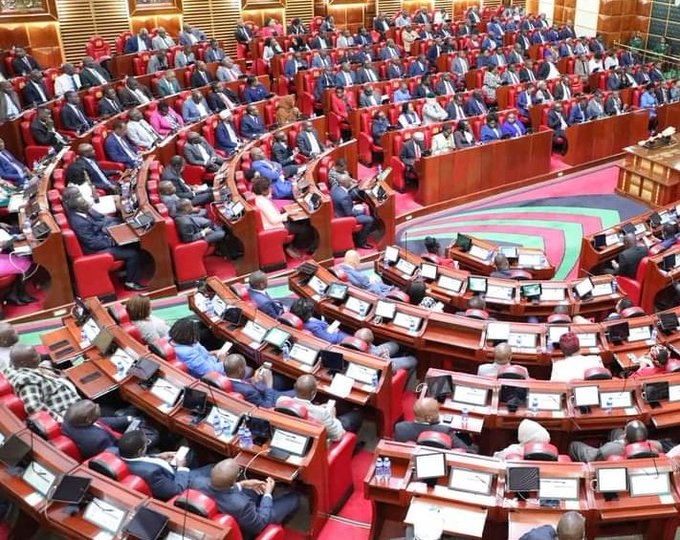
Inadequate formal employment has left GenZs in Kenya and Africa at large dependent on digital jobs, a new survey indicates, with a few going into entrepreneurship.
This, as universities in the country continue to churn at least 50,000 graduates annually, according to the Commission for Higher Education data, with about 500,000 youth also graduating from various tertiary institutions yearly ready to enter the job market.
A further one million young people enter into the labour market annually without any skills, some having either dropped out of school or completed school and not enrolled in any college.
The Federation of Kenya Employers notes that although the overall unemployment in Kenya is at 12.7 per cent, youth ( 15 – 34 year olds), who form 35 per cent of the Kenyan population have the highest unemployment rate, of 67 per cent.
Last year, the economy created 848,200, the Kenya National Bureau of Statistics ‘ Economic Survey 2024 indicates mainly in the informal sector, with wage employment in the modern sector accounting for 122,800 new jobs.
“The informal sector created 720,900 new jobs and accounted for 85 per cent of all the new jobs created in 2023,” KNBS says in its report.
A survey by service research provider –GeoPoll, 66.7 per cent of the country’s Generation Z (GenZs) are currently unemployed. About 9.38 per cent of those surveyed said they were employed, while 13.46 per cent own a small business.
“This data sheds light on the current employment landscape in Kenya despite advancements in technology and the growing trend of remote work,” the Denver, US headquarters firm, with offices in Kenya, says in its report.
The high unemployment has seen most of them seek online gigs as opposed to formal employment.
Some of the most common jobs accessible by the youth include social media management, transcription, graphic designing, proofreading, copywriting and virtual assistance, among others.
With online platforms such as Google offering tutorial for most of these jobs, a good number are reported to gain skills online and tap into the opportunities where individuals are earning up to Sh8,000 per day.
“This generation is viewed as tech-savvy, mobile-centric, and actively involved in creative and entrepreneurial pursuits, ranging from tech startups to artistic endeavours,” GeoPoll states.
HIGH PHONE USAGE
According to the survey, the Gen Z’s defining characteristic is their reliance on mobile technology, with an overwhelming 96.26 per cent of respondents indicating that they rely on mobile phones for communication and daily activities.
Additionally, 2.9 per cent of respondents sometimes rely on technology for communication, while only two per cent do not depend on it at all.
“While a significant portion of Gen Z in Kenya is experiencing unemployment, members of other generations often perceive them as lazy and lacking in ambition,” GeoPoll indicates.
However, when Gen Z respondents were asked to assess their ambition relative to that of other generations, the results painted a different picture.
Majority ( 82.9 per cent )consider themselves ambitious with 11.9 per cent indicating they are somewhat more ambitious than previous generations, with only 3.5 per cent expressing neutrality and a mere 3.2 per cent viewing themselves as less ambitious.
Though previous generations have commonly emphasised the significance of education for future opportunities, Gen Z overwhelmingly shares this belief, according to the survey.
The study reveals that 91 per cent of Gen Z respondents consider education to be important, with an additional 7.9 per cent believing it to be somewhat important.
Only 3.4 per cent of respondents do not view education as important.
“These statistics illustrate that, akin to their predecessors, Gen Z places great value on education as a crucial determinant of future success,” the survey says.
This exclusive survey was run via the GeoPoll mobile application between July 2024 17– 23 in Kenya. The sample size was 1,986, composed of diverse sample including a gender composition of 57 per cent male and 43 per cent female, and an age group of 18-27.
KEEN ON JOBS ABROAD
Meanwhile, the country’s young population, which is struggling to secure jobs and access credit to invest in businesses is seen to increasingly seek opportunities abroad.
According to a report by Odipo Dev and Africa Uncensored, titled Fame, Fortune and Freedom; Decoding the Shape of the Dream for Kenya’s Gen Z, 84 per cent of Gen Zs are ready to leave the country to seek opportunities elsewhere.
“High internet penetration and a tough economic environment are reshaping how young Kenyans think about their future and what their expectations of the work environment are,” the report reads in part.
As per the report, only 16 per cent expressed a preference for continuing living in the country. High youth unemployment rates, political instability, and limited opportunities for career advancement in Kenya are signifi cant motivators for this, according to experts.
Many young Kenyans, when asked, felt that their skills and education were not being adequately rewarded, leading to frustration and a search for better prospects elsewhere.
GOVERNMENT’S PLAN
President William Ruto has been vocal about creating a digital economy with his administration identifying “Digital Superhighway and Creative Industry”, under the Bottom-Up Economic Transformation Agenda (BETA), as one of key focus areas.
According to the President, the government is investing in the digital economy to create more opportunities for the youth, even as it remains keen on making Kenya an ICT innovation hub.
Drivers include the National ICT Policy, the Kenya Start-Up Act, Data Protection Act, Digital Economy Blueprint and the Computer Misuse and Cybercrimes Act and the Konza Technopolis project.
“The digital transformation agenda is real, feasible and anchored on a robust institutional framework,” Ruto said during a recent forum.
The goal, he noted, is to scale up government investments in the relevant infrastructure, including the national broadband and digital hubs, to create jobs for at least one million digital workers in the next five years.
The country is also implementing the Kenya National E-commerce Strategy, launched in December 2023, expected to provide an enabling environment for the development of trusted e-commerce services accessible to and used by all.
It therefore provides the country with a blueprint upon which to build on the performance of its e-commerce initiatives to ensure growth, competitiveness and accessibility of services provided under this sector, according to KNBS.
This strategy, it says, offers numerous opportunities for micro, small and medium-sized enterprises (MSMEs), digital entrepreneurs and players in the first, middle, and last-mile service delivery.
“The digital space facilitates breaking down geographical barriers and fostering innovation,” KNBS said.
President Ruto has also been urging Kenyans to seize employment opportunities abroad, with his government entering into a number of deals with foreign countries to create opportunities for Kenyans.
As of July, the govenrment said
there were about 400,000 job opportunities in the diaspora.

















